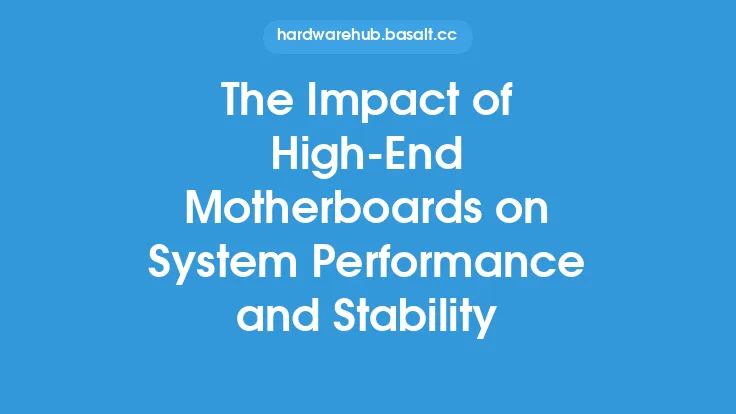Upgrading to a high-end GPU can have a significant impact on the overall performance and capabilities of a computer. A high-end GPU is designed to handle demanding graphics and compute tasks, making it an essential component for gamers, graphics designers, and other professionals who require high-performance computing. In this article, we will explore the benefits of upgrading to a high-end GPU and what to expect from this type of upgrade.
Introduction to High-End GPUs
High-end GPUs are designed to provide exceptional performance, power efficiency, and features. They are typically built with advanced architectures, such as NVIDIA's Ampere or AMD's RDNA 2, which provide significant improvements in performance, power consumption, and thermal management. High-end GPUs also often feature advanced cooling systems, such as liquid cooling or triple-fan designs, which help to keep the GPU at a safe temperature during intense usage.
Performance Benefits
One of the primary benefits of upgrading to a high-end GPU is the significant improvement in performance. High-end GPUs are designed to handle demanding graphics and compute tasks, such as 4K gaming, video editing, and 3D modeling. They provide faster frame rates, lower latency, and improved responsiveness, making them ideal for applications that require high-performance graphics. Additionally, high-end GPUs often support advanced technologies, such as ray tracing, artificial intelligence, and variable rate shading, which can enhance the overall visual experience.
Power Efficiency
High-end GPUs are also designed to be power efficient, which can help to reduce energy consumption and lower electricity bills. Modern high-end GPUs often feature advanced power management systems, such as NVIDIA's GPU Boost or AMD's PowerTune, which can dynamically adjust the GPU's clock speed and voltage to optimize performance and power consumption. This can help to reduce the overall power consumption of the system, making it more efficient and environmentally friendly.
Features and Technologies
High-end GPUs often support a wide range of advanced features and technologies, such as multi-monitor support, HDR, and virtual reality. They may also support advanced audio technologies, such as 3D audio and surround sound, which can enhance the overall gaming and entertainment experience. Additionally, high-end GPUs often feature advanced software support, such as NVIDIA's GeForce Experience or AMD's Radeon Software, which can provide features like automatic driver updates, game optimization, and performance monitoring.
Thermal Management
High-end GPUs often feature advanced thermal management systems, such as liquid cooling or triple-fan designs, which can help to keep the GPU at a safe temperature during intense usage. This can help to improve the overall reliability and lifespan of the GPU, as well as reduce noise levels and improve system stability. Advanced thermal management systems can also help to improve the overall performance of the GPU, as they can allow for higher clock speeds and more aggressive performance tuning.
Compatibility and Upgrade Path
When upgrading to a high-end GPU, it is essential to ensure that the new GPU is compatible with the existing system. This includes checking the motherboard's PCIe slot configuration, power supply, and cooling system to ensure that they can support the new GPU. Additionally, it is crucial to consider the upgrade path, as some high-end GPUs may require a new motherboard or power supply to function properly. It is also important to research the GPU's driver support and software compatibility to ensure that it will work seamlessly with the existing operating system and applications.
Conclusion
Upgrading to a high-end GPU can have a significant impact on the overall performance and capabilities of a computer. High-end GPUs offer exceptional performance, power efficiency, and features, making them ideal for gamers, graphics designers, and other professionals who require high-performance computing. When considering an upgrade, it is essential to research the GPU's compatibility, features, and thermal management system to ensure that it meets the specific needs and requirements of the system. With the right high-end GPU, users can enjoy faster frame rates, lower latency, and improved responsiveness, making it an excellent investment for those who demand the best from their computer.





